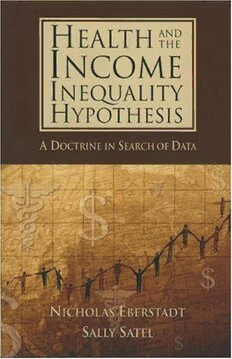Download Health and Income Inequality Hypothesis: A Doctrine in Search of Data PDF Free - Full Version
Download Health and Income Inequality Hypothesis: A Doctrine in Search of Data by Nicholas Eberstadt in PDF format completely FREE. No registration required, no payment needed. Get instant access to this valuable resource on PDFdrive.to!
About Health and Income Inequality Hypothesis: A Doctrine in Search of Data
Few would take exception to the proposition that an improvement in the material well-being of the poor would enhance not only their living standards but their health as well. A number of influential recent studies, however, purport to show that inequality in income--not poverty per se--is bad for people's health. This "inequality hypothesis" is meant to apply to everyone, regardless of wealth or social standing, and predicts that the risk of illness depends upon whether one lives in a society that is stratified or egalitarian. Thus, according to this hypothesis, while the poor may suffer the most from inequality, the better off and even the rich suffer as well. The enthusiasm many researchers and observers feel for this theory goes well beyond what might be justified by the evidence. The inequality hypothesis too often relies upon limited or unrepresentative data, hazily expounded causality, elementary econometric fallacies, and results that cannot be replicated. A very persuasive (although less publicly heralded) body of scholarship that challenges the inequality hypothesis is currently emerging. For example, by controlling for relevant variables--such as household income, maternal characteristics, education, and race--the relationship between income inequality and the health of infants and adults diminishes or disappears completely. This strongly suggests that income distribution is far less powerful a determinant of population health than the inequality hypothesis holds.
Detailed Information
| Author: | Nicholas Eberstadt |
|---|---|
| Publication Year: | 2004 |
| ISBN: | 9780844771694 |
| Pages: | 56 |
| Language: | English |
| File Size: | 0.195 |
| Format: | |
| Price: | FREE |
Safe & Secure Download - No registration required
Why Choose PDFdrive for Your Free Health and Income Inequality Hypothesis: A Doctrine in Search of Data Download?
- 100% Free: No hidden fees or subscriptions required for one book every day.
- No Registration: Immediate access is available without creating accounts for one book every day.
- Safe and Secure: Clean downloads without malware or viruses
- Multiple Formats: PDF, MOBI, Mpub,... optimized for all devices
- Educational Resource: Supporting knowledge sharing and learning
Frequently Asked Questions
Is it really free to download Health and Income Inequality Hypothesis: A Doctrine in Search of Data PDF?
Yes, on https://PDFdrive.to you can download Health and Income Inequality Hypothesis: A Doctrine in Search of Data by Nicholas Eberstadt completely free. We don't require any payment, subscription, or registration to access this PDF file. For 3 books every day.
How can I read Health and Income Inequality Hypothesis: A Doctrine in Search of Data on my mobile device?
After downloading Health and Income Inequality Hypothesis: A Doctrine in Search of Data PDF, you can open it with any PDF reader app on your phone or tablet. We recommend using Adobe Acrobat Reader, Apple Books, or Google Play Books for the best reading experience.
Is this the full version of Health and Income Inequality Hypothesis: A Doctrine in Search of Data?
Yes, this is the complete PDF version of Health and Income Inequality Hypothesis: A Doctrine in Search of Data by Nicholas Eberstadt. You will be able to read the entire content as in the printed version without missing any pages.
Is it legal to download Health and Income Inequality Hypothesis: A Doctrine in Search of Data PDF for free?
https://PDFdrive.to provides links to free educational resources available online. We do not store any files on our servers. Please be aware of copyright laws in your country before downloading.
The materials shared are intended for research, educational, and personal use in accordance with fair use principles.

